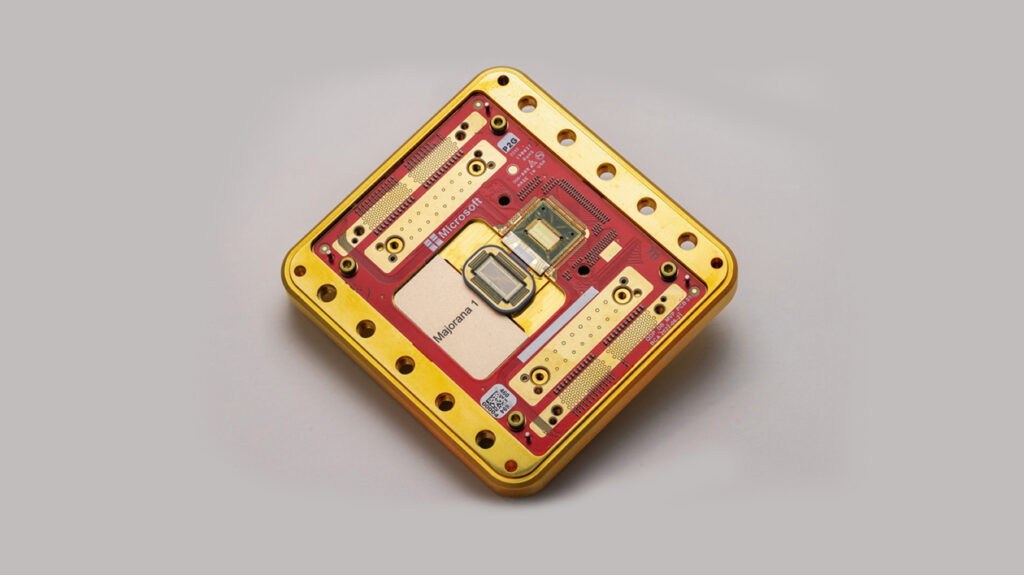Microsoft’s Majorana 1: Paving the Way to a Million Qubits
Microsoft unveils Majorana 1, the world’s first quantum processor powered by topological qubits

After nearly two decades of relentless research, Microsoft is now transitioning quantum computing from theoretical exploration to practical innovation. Their breakthrough—the Majorana 1 chip—is a quantum processing unit (QPU) that leverages a revolutionary topological core architecture. This approach not only tackles the longstanding issues of qubit instability and error-prone operations but also offers a scalable blueprint capable of eventually integrating up to one million qubits on a chip small enough to fit in your hand.
Unlocking the Secrets of Topological Qubits
At the heart of Majorana 1 is a novel material known as a topoconductor. What is it? A topoconductor is a novel material that creates a unique state of matter, distinct from solids, liquids, or gases. It enables the observation and control of Majorana fermions, exotic particles theorized for decades but only recently realized in practical applications. The topoconductor combines properties of semiconductors and superconductors, specifically using materials like indium arsenide and aluminum to achieve its functionality.
This breakthrough material creates an environment where Majorana zero modes—exotic quasiparticles theorized to be their own antiparticles—can emerge and be controlled with high precision. By encoding quantum information in these Majorana modes, Microsoft’s topological qubits are designed to be naturally more robust against decoherence and noise than their traditional counterparts.
A Quantum Leap Toward Scalability
From their recent research paper, Microsoft’s experts detail how Majorana 1 is more than just a scientific curiosity—it’s a strategic stepping stone toward a scalable quantum computer. Here are some of the key points:
- Scalability Roadmap: The chip currently demonstrates eight topological qubits. However, the architecture is engineered with scalability in mind—a clear pathway exists to pack up to one million qubits onto a single chip. This “transistor for the quantum age” could revolutionize how we process complex data.
- Error Resistance: By embedding error correction at the hardware level, the design dramatically reduces the error rates that have traditionally plagued quantum systems. This digital control over qubit states simplifies the challenge of quantum error correction.
- Compact Integration: The vision is to integrate these quantum processors into platforms like Azure Quantum, merging classical computing power with quantum-enhanced capabilities to solve problems that are currently intractable.
Bridging the Gap Between Theory and Application
While the technical details are fascinating, the implications of Microsoft’s work stretch far beyond the lab. With Majorana 1, Microsoft is laying the groundwork for quantum computers that could:
- Revolutionize Drug Discovery: Simulate complex molecular interactions with unprecedented precision, potentially cutting years off the research process.
- Advance Materials Science: Model new compounds and predict material behaviors to develop self-healing materials or more efficient energy storage systems.
- Enhance Cryptography and Security: Tackle encryption challenges by processing computations that are impossible for classical computers, leading to breakthroughs in cybersecurity.
The Road Ahead
The journey is not without its challenges. As noted in discussions across the quantum research community, ensuring long-term coherence and full control over these exotic qubits remains a critical hurdle. Microsoft’s approach, however, is bolstered by extensive peer-reviewed research published in high-impact journals like Nature, and by strategic partnerships with research agencies such as DARPA. These collaborations underscore a broader industry commitment to overcoming the technical barriers that still exist.
Final Thoughts
Microsoft’s unveiling of the Majorana 1 chip is more than a technological milestone—it represents a paradigm shift. By integrating innovative materials science with advanced quantum engineering, Microsoft is not just inching closer to a fault-tolerant quantum computer; it’s paving a tangible path toward solving some of the world’s most complex and critical challenges. Although a fully scalable, commercial quantum computer may still be a few years away, Majorana 1 provides a compelling glimpse into a future where quantum computing could transform industries from healthcare to logistics, and beyond.
References
- Microsoft unveils Majorana 1, the world’s first quantum processor powered by topological qubits - Microsoft Azure Blog
- Majorana 1 Explained: The Path to a Million Qubits - Microsoft (YouTube)
- Microsoft Unveils First Quantum Computing Chip - Bloomberg Technology (YouTube)
- Satya Nadella – Microsoft’s AGI Plan & Quantum Breakthrough - Dwarkesh Patel (YouTube)